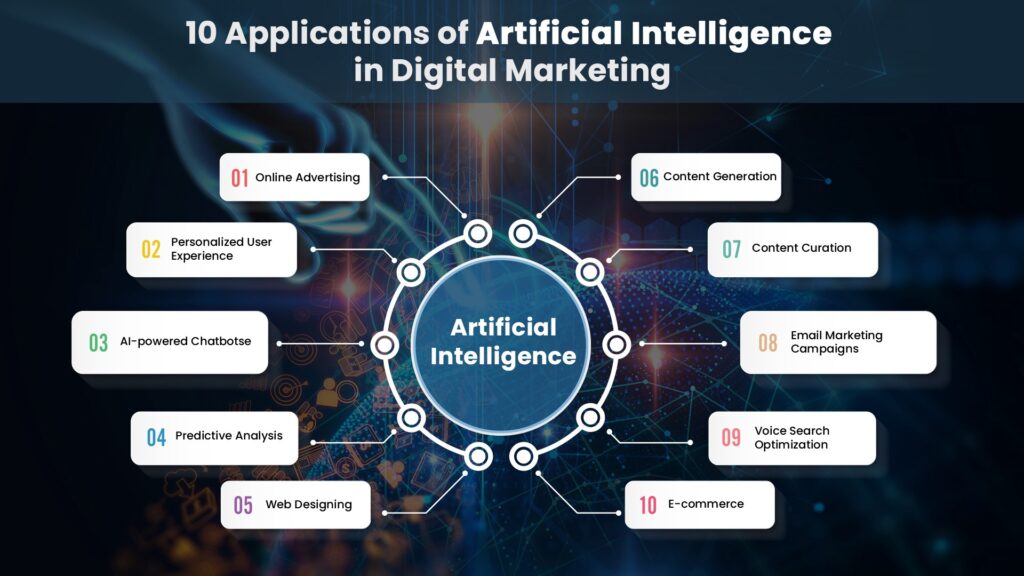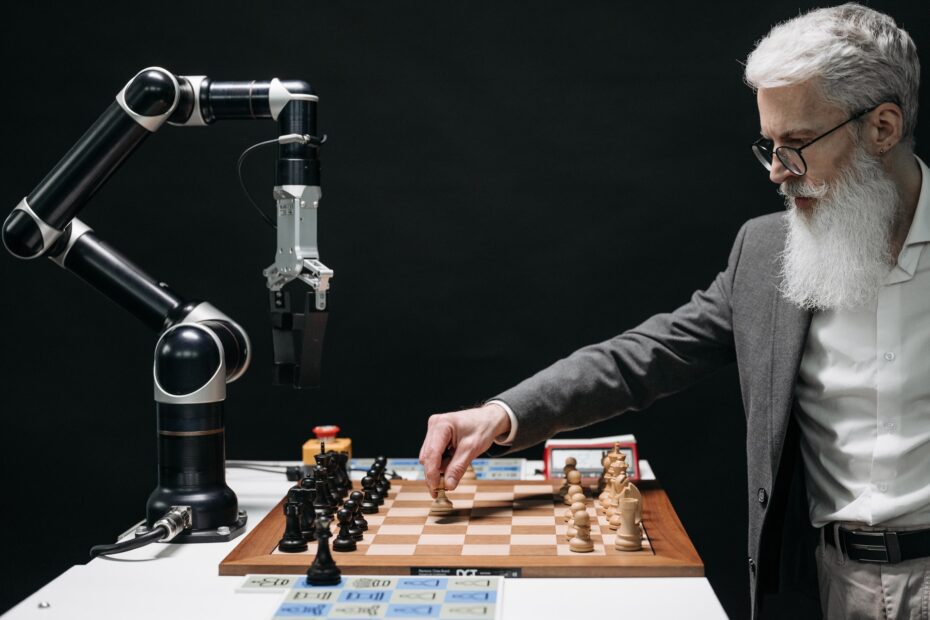Last year, I decided to re-frame my personal brand strategy and launch a new blog.
This is going to be fun!
My first post is about artificial intelligence (AI) in digital marketing; specifically how the combination of AI & machine learning will shape the future of both industries.
This isn’t something that’s happening in the distant future; it’s happening right now. It’s just not very visible to the mainstream market yet, and there are still many misconceptions about what AI actually is.
The digital marketing industry, in particular, has been slow to wake up to this change – as noted by Google Cofounder Sergey Brin: “Current machine learning technology [AI] has already reached a point where it can do very well at specific tasks, such as image recognition… But we are still often limited by the fact that machines don’t understand the meaning of the images they look at.”
To illustrate the true power of AI in marketing, we’ll begin by exploring how AI has already had a profound impact on our daily lives.
We’ll then explore some examples of how AI is already being used (or will soon be used) in digital marketing. Let’s get started!

The Rise of Artificial Intelligence: Improving Our Daily Lives
There’s been a lot of recent media coverage about AI & how it will affect the future.
Given that we’re already seeing its impact on our lives in the present, I wanted to take a minute to explore some examples of how it’s making our daily life better right now:
Real-Time Translation
An app like Google Translate instantly translates text or audio from one language to another.
It’s not perfect, but it’s pretty accurate in most cases and has made a huge difference for millions of people.
Household Assistance
If you have an Amazon Echo, Google Home, or any other number of smart home devices, you’re already using AI every day.
These products allow you to manage your calendars, check the weather and build shopping lists – all the sound of your voice.
This is just the beginning too; soon we’ll see AI assistants embedded in many more consumer products ranging from thermostats to cars and beyond.
Driverless Cars
There’s nothing quite like riding a shotgun in a driverless car while strolling along in the sunshine.
Seeing the world as we travel from place to place, it’s hard to remember that we’re not actually driving ourselves… and this is only going to become more common.
Automated Marketing Processes
When I worked at a Fortune 5000 Tech company, we had a marketing automation platform that sent out sales emails based on our lead scoring & campaign activity.
This required a lot of work to build, and still required constant maintenance after the fact – including human review.
Today we have marketing automation software that can be built once and then left alone to function autonomously (meaning business processes like lead nurturing, drip email campaigns, and automated sales emails are no longer bound by human limitations).
The cybersecurity industry has also benefited from automation.
A few years ago, security firm McAfee acquired web traffic management company Omnilert. Their technology uses AI to analyze huge amounts of data and identify cyber threats – allowing for a more comprehensive defense of an organization’s network and security.
There’s clearly still some work left to be done here as far as what AI can do for security, but the potential is clear.
AI Defining & Revising Industry Standards
Today it’s common for companies to have a Chief Data Officer or people responsible for managing data collection internally.
This has more to do with the healthcare industry than anything else since having uniform quality standards and access across institutions is crucial when it comes to accurate patient health records.
Soon, this is going to become a more common industry norm outside of healthcare as well.
Marketing tech company Oktopost states that AI and Machine Learning are “the two most important trends for digital marketers in coming years” (and they’re probably right).
The majority of marketing departments still use Excel spreadsheets to manage their campaigns, but that will soon change.
The rise of self-learning algorithms will make it easy and even cheap for marketers to test new content, optimize conversion rates and assign a monetary value to each customer.
Far from being something far off in the distant future, marketing automation software already allows marketers to create automated lead nurturing and drip email campaigns, which are created by AI using machine learning.
Faster Decisions & Better Outcomes
One example of a decision made based on an algorithm is how Tesla uses AI to optimize its self-driving cars (they call it “Autopilot AI“).
Tesla vehicles have cameras connected to their onboard computers that can analyze objects in real-time. The system then uses video footage to identify pedestrians and bicyclists, as well as “Dynamic Radar” (lasers) used for object detection.
Using existing information, AI can predict what will happen next – or at least make an educated guess based on historical data.
What it cannot do is create entirely new information that is not based on past experience (and thus cannot move outside of its own logical decision tree).
Think about it like this:
The human mind is an endlessly creative computer that learns almost everything from experience.
It takes in new information and incorporates these lessons into a model of the world used every time the same situation occurs again – think Pavlov’s dog.
The value of experience is that it helps us make better decisions based on detailed knowledge and past experiences.
The downside to this is human error, which occurs when we lack the information needed to make a decision or don’t bother taking new data into consideration.
For example, one of the most common causes of plane crashes is “controlled flight into terrain” (CFIT).
When this happens, pilots are lacking the proper information about their altitude and direction in relation to elevation and terrain – or aren’t bothering to make a visual check due to complacency.
AI is already capable of making more accurate decisions based on historical data than humans can because it doesn’t get fatigued from analysis over time; you can’t make a computer crash from overwork.
For example, pilots are allowed to get 9 hours of sleep per night (in case you were wondering), and it’s not uncommon for them to miss things they would have noticed if they were fresh.
Plus, humans can only process so much data at one time – making the likelihood of misinterpreting events higher.
However, AI doesn’t have this limitation since it can be programmed to take into account as much or as little data as needed for a particular scenario.
Thus, while humans are limited in their reasoning capabilities, algorithms, and neural networks are not.
While computers might not be able to solve problems like the meaning of life, they can do things that we struggle with – like making accurate predictions based on large amounts of historical data.
At the same time, these machines also have a learning element built into them – meaning computers will be able to improve their decision-making capabilities over time based on feedback from humans and other AI systems.
Alright, let’s go back to our agenda.
AI in Digital Marketing
Here are some of the ways AI is changing the marketing mix:
AI Will Change the Way You Collect and Analyze Data
Humans have been using data to help make decisions since the dawn of time.
We’ve generated information about our customers, potential customers, competitors, and industry trends for so long now that it’s hard to imagine a world without it.
But if you think about it, most of the data we use is based on facts or even opinions, which means some of it might be unreliable (not to mention incomplete).
For example, let’s say you run a coffee shop and are looking to see how many people purchased a latte vs. an iced coffee this year.
You could go through your point-of-sale (POS) data and see how many orders came through, but the information might not be accurate for a few reasons:
You ran out of iced coffee one day so it doesn’t show up in the numbers.
Your POS system is slow, so some sales were recorded after closing time or even earlier that day.
A third party delivered coffee to an event, which is reflected as revenue but not in your store’s sales data.
Or if you’re a market researcher who wants to know what customers think about your product or company, you could use a survey for the results:
However, surveys can be unreliable because of biases and other factors like attention span and availability of information.
Here’s where AI comes into play.
With AI and machine learning, you can use algorithms to “extract” useful information from data that the human eye may have missed.
For example, the technology could look at POS and sales data and – based on past orders – predict what customers want before they even ask for it.
Taking this a step further, AI could also use the same data to determine what customers bought and offer them similar items in the future:
This is already happening with online stores.
For example, Amazon will recommend books that you might like based on your browsing history (and purchases):
This not only helps sell more products for Amazon by anticipating what customers want, but it also helps the customer discover new books they might like that they otherwise wouldn’t have.
And if you’re using a survey to get feedback from a target audience, AI could be programmed to ask certain questions and interpret responses based on past data (like “What do you think of our company?”):
It could then use the feedback to improve your products, content, or marketing strategy (“We received a lot of negative responses surrounding our customer support. What could we do differently?”)
Finally, AI could also analyze who’s interacting with you and why they’re doing it.
This means that marketers would be able to run every social media promotion and see exactly how people are interacting with it, where they’re coming from, and how the promotion is performing overall:
In addition, AI could also use real-time data to predict the best time to schedule a blog post or what keywords people are searching for that will help your business – even on a local level.
To sum up, it is not hard to see how AI will change the way marketers do their jobs.
Using algorithms for data collection, analysis, and interpretation means that more accurate information can be gathered with less effort on our part.
With this technology at your fingertips, you’ll have insights into what customers want or need before they ask for it – which should help you increase sales in a variety of ways.
Good luck!

Ali is a digital marketing blogger and author who uses the power of words to inspire and impact others. He has written for leading publications like Business2Community, Inc. Magazine, and Marketing Profs. When not writing, he enjoys spending time with his family.
